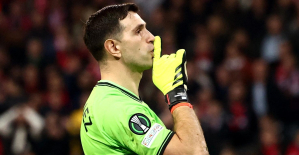The chinese president, Xi Jinping, begins this Tuesday for a State visit until Thursday to Spain. Have passed thirteen years since the last of a chinese head of State to Spain and the circumstances now are very different from then. In 2005, when he came to Hu Jintao to Madrid, Spain, living in the crest of the wave of the “boom” of the brick and its large companies aspired to landings of triumph in the oriental country. Beijing still did not entirely believe his rapid development. Then, its economy accounted for 4% of global GDP. Today, Spain is still suffering from the aftermath of the 2008 crisis. China is the second economy of the planet, 17% of the overall wealth and a great power, claiming strongly a role on the international stage.
MORE INFORMATION
The chinese prefer to buy flats before investing in Spanish companies and to get the ‘golden visa’ Aragon and China approach their markets Tribune: 'What New era Spain-China?', by Xulio RíosDuring his visit, Xi will meet with king Felipe VI and the president of the Government, Pedro Sanchez, and will sign a joint statement which will serve, according to Beijing, a “roadmap” for the development of the bilateral relationship. They will also meet with the presidents of respective of the Congress and the Senate —Ana Pastor and Pio Garcia-Escudero— and head to the Courts. In a ceremony in the town Hall, the mayor of Madrid, Manuela Carmena, give you the keys of the city.
The relationship of China and Spain is, as described in the Report 2018 of the Elcano Royal Institute on the bilateral ties, “clearly asymmetric” in favor of Beijing. And that asymmetry “is going to continue to grow, as China will continue to increase its international weight” to a pace at which Spain can't aspire to, explained Mario Esteban, principal investigator for the Asia-Pacific region of the Institute, in presenting the text in an event at the Cervantes Institute of Beijing.
For Spain, as in 2005, the interest in the relationship has an economic character. We are seeking to increase exports —last year grew by 28% and were around usd 6.250 million euros, but Spain remains burdened by a chronic deficit in the balance of trade, attract investment and china seek cooperation agreements between companies of the two countries in third markets.
For China, the interest of Spain is, above all, political. The absolute priority of the foreign policy of china is the initiative “New Silk road”, the network of infrastructures for land and maritime that wants to connect with the rest of the world. As underscored by the deputy minister Casinomaxi of Foreign affairs Wang Chao last Friday in a press conference, the position of Spain in the southwest of Europe granted “geographical advantages unique” in this project, and Madrid "has responded actively to the plan", although one of their projects, the most emblematic, the train Madrid-Yiwu, has so far offered mixed results.
Beijing also seeks to strengthen its relationship with other partners, given the deterioration of its relations with the united States. The visit comes barely a few days before the G20 summit in Buenos Aires and the meeting there between Xi Jinping and the US president, Donald Trump, will be crucial to try to resolve the trade war and straightening out the relations between the two great world powers.
Europe, in the eyes of China, is a crucial alternative if its dispute with the united States continues and is exacerbated. Beijing is working to cultivate it and, in their eyes, Spain can play a key role: it is a country that has maintained a relationship historically cordial with China within the EU and whose weight within the Union is expected to grow after the "Brexit".
“Also within the EU there are tensions” around the protectionism and unilateralism, pointed last week to the director of the department of European Diplomacy of the Chinese Academy of Social Sciences, Zhao Chen. Spain is “a country that is open, tolerant, inclusive, which may help ease those tensions”.
Madrid and Beijing “share the same opinion, or similar, on many issues of international relations, or regional,” he said, for his part Wang Chao. Certainly, Spain has tended to be placed among the voices of european less resonant in public against the policies of Beijing over Xinjiang, Tibet or Taiwan. Not signed last week a letter that yes wanted fifteen western embassies in Beijing in which they demanded a meeting with the highest chinese official in Xinjiang, Chen Jianguo, to talk about the fields of re-education of the muslim minorities in that region of western china.
But neither has it wanted to support the enthusiasm of Beijing to create forums sub-regional in dealing with different european countries, as already done with the countries of the East and tries in the South. A few forums from Brussels are perceived as attempts to divide the EU. From Madrid insists that Europe must remain united and that they share the claims of Brussels on intellectual property and access to markets.
Neither, despite the insistence from the initial Beijing, Spain will sign a memorandum of understanding of specific support for the New Silk road. In Europe, countries like Greece have signed this document. In Madrid, it is stressed that the “Initiative of the Strip and the Path” (BRI, the official name of the plan) is a good idea; but as in Brussels and other capitals of the EU, in Washington or in Tokyo, they are calling for guarantees of transparency, feasibility of projects and to avoid that the beneficiary countries of the projects incurring excessive debt. Yes will be concluded, according to the chinese Foreign Ministry, agreements for collaboration in third markets, tax, trade, culture or technology.
A visit to the long-awaited
The journey took a long time in the pipeline, almost since the arrival of Xi to power in 2012. The chinese president had a stopover briefly in Gran Canaria in 2016, at a rest stop in the that he met with the then vice-president Soraya Sáez de Santamaría. But for a State visit there were frictions as the judicial investigations opened by the National court for genocide in Tibet against former president Jiang Zemin and ex-prime minister Li Peng in 2014, or the research of money laundering in the madrid headquarters of the chinese state bank ICBC. The then president of the Spanish government, Mariano Rajoy, yes he traveled during the same period to Beijing: a State visit in 2014, and another two to participate in international summits in 2016 and 2017.

 Sydney: Assyrian bishop stabbed, conservative TikToker outspoken on Islam
Sydney: Assyrian bishop stabbed, conservative TikToker outspoken on Islam Torrential rains in Dubai: “The event is so intense that we cannot find analogues in our databases”
Torrential rains in Dubai: “The event is so intense that we cannot find analogues in our databases” Rishi Sunak wants a tobacco-free UK
Rishi Sunak wants a tobacco-free UK In Africa, the number of millionaires will boom over the next ten years
In Africa, the number of millionaires will boom over the next ten years WHO concerned about spread of H5N1 avian flu to new species, including humans
WHO concerned about spread of H5N1 avian flu to new species, including humans New generation mosquito nets prove much more effective against malaria
New generation mosquito nets prove much more effective against malaria Covid-19: everything you need to know about the new vaccination campaign which is starting
Covid-19: everything you need to know about the new vaccination campaign which is starting The best laptops of the moment boast artificial intelligence
The best laptops of the moment boast artificial intelligence Bitcoin halving: what will the planned reduction in emissions from the queen of cryptos change?
Bitcoin halving: what will the planned reduction in emissions from the queen of cryptos change? The Flink home shopping delivery platform will be liquidated in France
The Flink home shopping delivery platform will be liquidated in France Bercy threatens to veto the sale of Biogaran (Servier) to an Indian industrialist
Bercy threatens to veto the sale of Biogaran (Servier) to an Indian industrialist Switch or signaling breakdown, operating incident or catenaries... Do you speak the language of RATP and SNCF?
Switch or signaling breakdown, operating incident or catenaries... Do you speak the language of RATP and SNCF? The main facade of the old Copenhagen Stock Exchange collapsed, two days after the fire started
The main facade of the old Copenhagen Stock Exchange collapsed, two days after the fire started Alain Delon decorated by Ukraine for his support in the conflict against Russia
Alain Delon decorated by Ukraine for his support in the conflict against Russia Who’s Who launches the first edition of its literary prize
Who’s Who launches the first edition of its literary prize Sylvain Amic appointed to the Musée d’Orsay to replace Christophe Leribault
Sylvain Amic appointed to the Musée d’Orsay to replace Christophe Leribault Skoda Kodiaq 2024: a 'beast' plug-in hybrid SUV
Skoda Kodiaq 2024: a 'beast' plug-in hybrid SUV Tesla launches a new Model Y with 600 km of autonomy at a "more accessible price"
Tesla launches a new Model Y with 600 km of autonomy at a "more accessible price" The 10 best-selling cars in March 2024 in Spain: sales fall due to Easter
The 10 best-selling cars in March 2024 in Spain: sales fall due to Easter A private jet company buys more than 100 flying cars
A private jet company buys more than 100 flying cars This is how housing prices have changed in Spain in the last decade
This is how housing prices have changed in Spain in the last decade The home mortgage firm drops 10% in January and interest soars to 3.46%
The home mortgage firm drops 10% in January and interest soars to 3.46% The jewel of the Rocío de Nagüeles urbanization: a dream villa in Marbella
The jewel of the Rocío de Nagüeles urbanization: a dream villa in Marbella Rental prices grow by 7.3% in February: where does it go up and where does it go down?
Rental prices grow by 7.3% in February: where does it go up and where does it go down? With the promise of a “real burst of authority”, Gabriel Attal provokes the ire of the opposition
With the promise of a “real burst of authority”, Gabriel Attal provokes the ire of the opposition Europeans: the schedule of debates to follow between now and June 9
Europeans: the schedule of debates to follow between now and June 9 Europeans: “In France, there is a left and there is a right,” assures Bellamy
Europeans: “In France, there is a left and there is a right,” assures Bellamy During the night of the economy, the right points out the budgetary flaws of the macronie
During the night of the economy, the right points out the budgetary flaws of the macronie These French cities that will boycott the World Cup in Qatar
These French cities that will boycott the World Cup in Qatar Europa Conference League: the semi-final flies to Lille, which loses to the wire against Aston Villa
Europa Conference League: the semi-final flies to Lille, which loses to the wire against Aston Villa Lille-Aston Villa: Cash disgusts Lille, the arbitration too... The tops and the flops
Lille-Aston Villa: Cash disgusts Lille, the arbitration too... The tops and the flops Handball: Les Bleues in the same group as Spain at Euro 2024
Handball: Les Bleues in the same group as Spain at Euro 2024 Europa Conference League: for Létang, Martinez “does not have the attitude of a high-level athlete”
Europa Conference League: for Létang, Martinez “does not have the attitude of a high-level athlete”


















